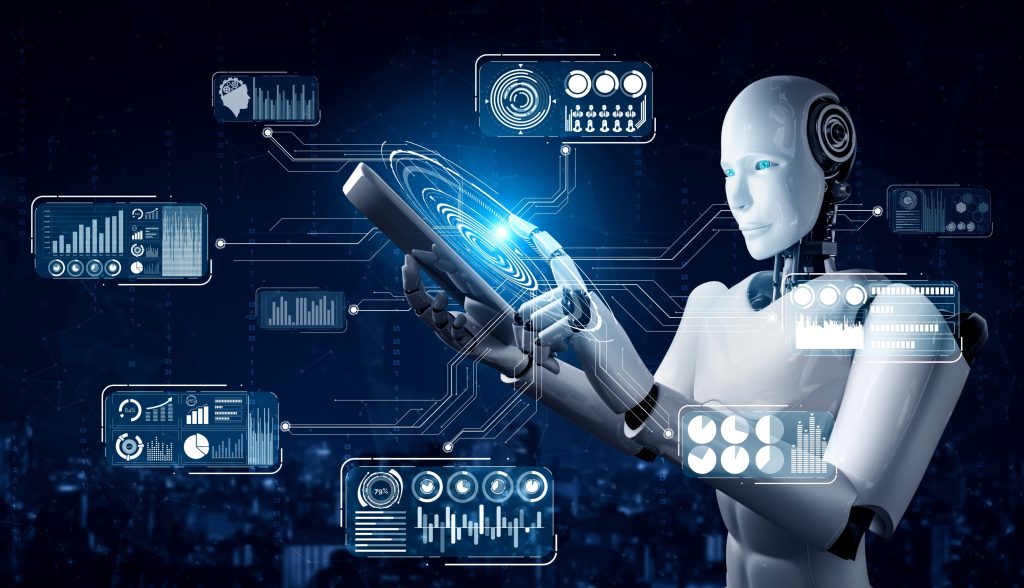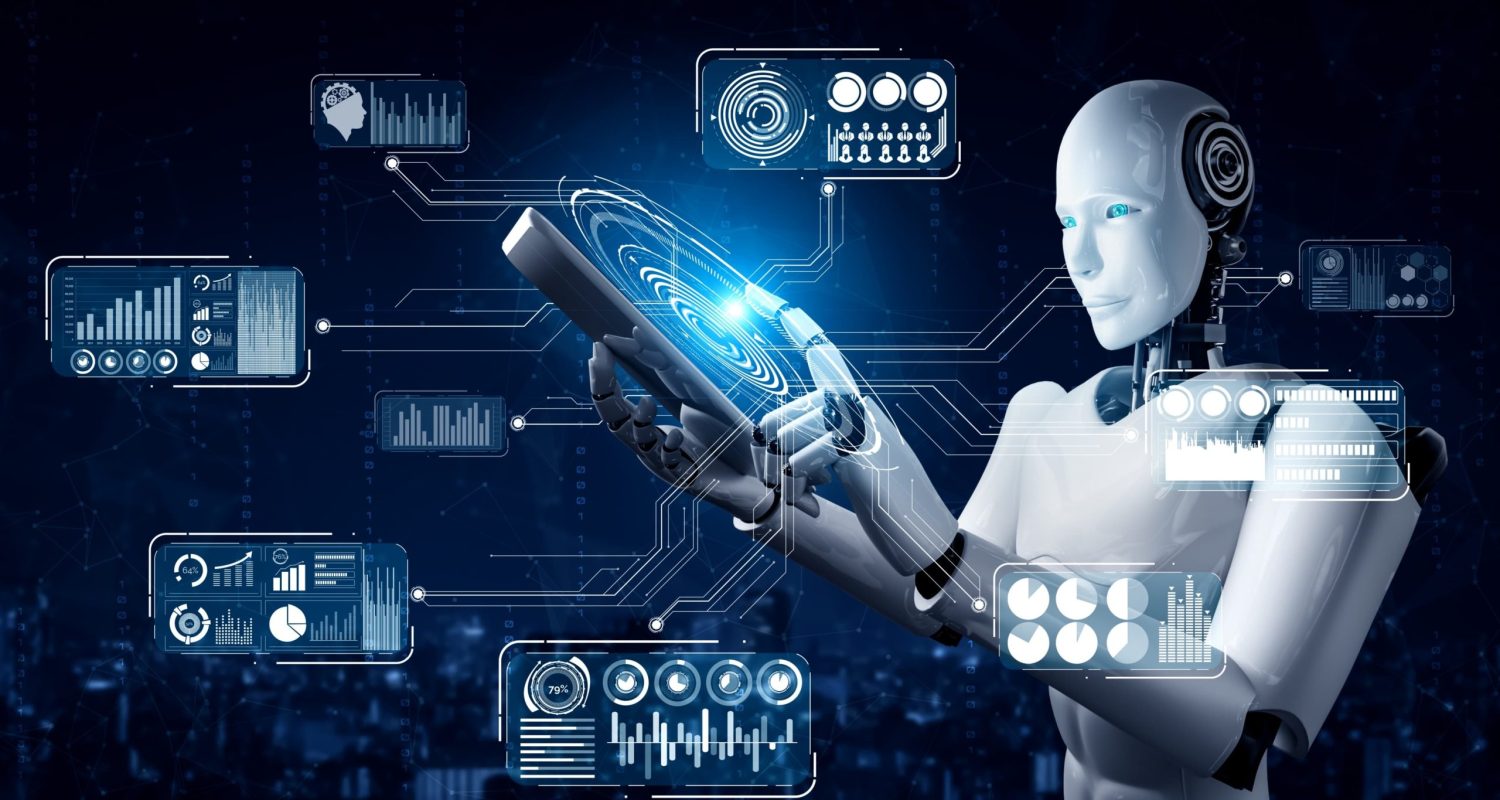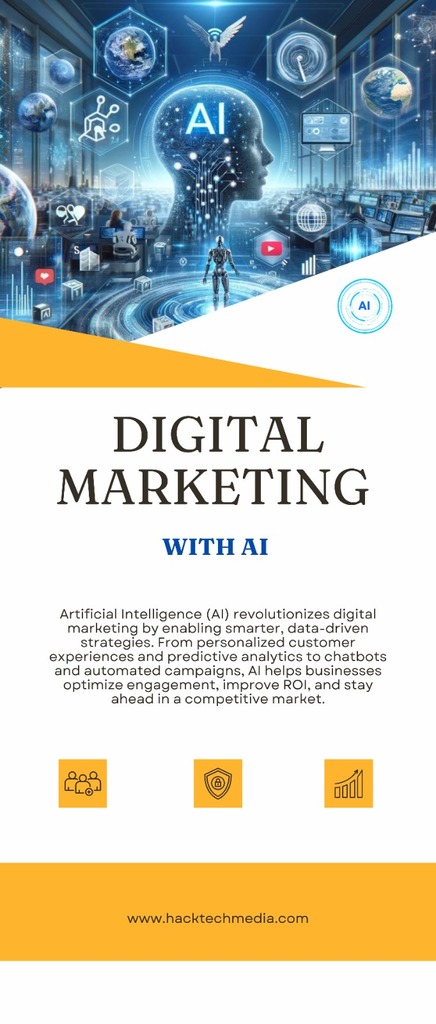
Introduction to AI and Machine Learning in 2024
Artificial Intelligence (AI) and Machine Learning (ML) are driving innovation across every major industry in 2024. From optimizing business operations to improving customer experiences, these technologies are reshaping the way organizations function. Machine learning models, powered by deep learning and advanced algorithms, are now capable of processing large datasets more accurately and quickly than ever before.
Industries are embracing AI to enhance automation, improve decision-making, and streamline workflows. Whether it’s through predictive analytics, natural language processing (NLP), or computer vision, AI’s impact is undeniable. Companies are also focusing on AI ethics, ensuring that these intelligent systems operate responsibly and ethically.
This post explores how AI and ML are being applied across sectors in real-world settings, driving transformation and fostering innovation.
Predictive Analytics and Business Intelligence
Predictive analytics, a subset of AI, is reshaping business intelligence by analyzing historical data to predict future trends. Financial services, retail, and manufacturing industries are leveraging this technology to optimize inventory management, detect fraud, and forecast demand.
For example, in retail, AI-powered tools can predict customer purchasing behavior, allowing businesses to offer personalized recommendations. In financial services, AI systems can analyze market trends and customer data to predict economic downturns or opportunities, aiding in strategic decision-making.
This shift toward data-driven insights is enabling organizations to make smarter, more informed choices, directly impacting their bottom line.
Natural Language Processing and Customer Interaction
Natural Language Processing (NLP) is revolutionizing customer interaction across sectors. From chatbots providing instant responses to customer queries to AI-driven sentiment analysis, businesses can now understand and interact with customers on a deeper level.
NLP applications are becoming increasingly important in sectors such as e-commerce, healthcare, and banking. Voice assistants like Siri and Alexa utilize NLP to interpret user commands, while businesses use AI-driven chatbots for round-the-clock customer support.
By leveraging NLP, organizations can enhance customer satisfaction, improve operational efficiency, and offer personalized experiences that drive loyalty.
Computer Vision: Revolutionizing Industries

Computer vision, a branch of AI, is playing a critical role in transforming industries like healthcare, automotive, and retail. It allows machines to interpret and understand visual data, such as images or videos, providing groundbreaking solutions to complex problems.
In healthcare, computer vision is used for diagnosing medical images, such as detecting early signs of cancer or analyzing MRI scans. In the automotive industry, it powers advanced driver-assistance systems (ADAS) and self-driving vehicles, improving road safety. Retailers are utilizing computer vision to enhance in-store experiences, such as implementing AI-powered checkout systems.
The possibilities are endless, with computer vision offering solutions that were once unimaginable.
Automation and Robotics in Smart Technology
AI-driven automation is leading the charge in smart technology, where robotics plays a key role in industries like manufacturing, logistics, and retail. These automated systems perform tasks with greater precision and speed than humans, significantly improving productivity and reducing costs.
For instance, in manufacturing, robotic systems powered by AI optimize production lines by automating repetitive tasks. In logistics, automation is enhancing warehouse management through robotic picking systems and smart inventory control. Retailers are increasingly using AI to automate stock replenishment and improve customer service.
The future of automation lies in its ability to integrate AI with human efforts, resulting in more efficient workflows across industries.
AI in Healthcare and Health Tech Innovation
The healthcare sector is undergoing a revolution with the integration of AI and machine learning. From diagnostic tools to personalized treatment plans, AI is enhancing patient outcomes and improving the efficiency of medical services.
AI-powered algorithms are capable of analyzing medical data with unprecedented accuracy. Predictive models help in identifying potential health risks before they become critical, while AI-driven devices assist surgeons in performing complex operations with precision.
AI Ethics: Navigating Innovation Responsibly
As AI and machine learning continue to advance, so does the conversation around AI ethics. Ensuring that AI systems are transparent, fair, and accountable is crucial to their widespread adoption.
Businesses are increasingly recognizing the need for responsible AI deployment. Ethical considerations include issues like algorithmic bias, data privacy, and the potential misuse of AI technologies. Establishing robust ethical guidelines helps mitigate risks and build trust with consumers.
2024 will see further development in AI governance frameworks as organizations aim to implement ethical AI solutions that prioritize fairness and transparency.
Autonomous Vehicles and Smart Cities
Autonomous vehicles (AVs) are a shining example of AI-driven innovation in 2024. These vehicles rely on machine learning algorithms and computer vision to navigate streets and avoid obstacles without human intervention.
Smart cities are also leveraging AI to optimize traffic management, reduce energy consumption, and enhance public safety. AI-powered surveillance systems, for instance, are used to monitor real-time activity and predict potential security threats.
With AI integration in urban infrastructure, smart cities and autonomous vehicles represent the future of connected, intelligent living environments.
AI Trends to Watch in 2024
Several key trends are emerging in AI and machine learning in 2024. Personalized AI experiences, intelligent systems, and AI-driven cybersecurity are just a few of the innovations making waves this year.
Personalization is taking center stage as businesses use AI to tailor products, services, and experiences to individual users. AI is also playing an increasingly vital role in securing systems, with machine learning algorithms detecting and preventing cyberattacks before they happen.
AI in Financial Services: Driving Efficiency and Security
In 2024, the financial services sector continues to be revolutionized by artificial intelligence and machine learning. AI is enhancing everything from fraud detection to investment strategies, allowing financial institutions to operate with greater efficiency and accuracy.
One of the most significant applications is in predictive analytics, where AI analyzes historical transaction data to predict potential fraud. This early detection helps banks and financial services prevent fraudulent activities before they escalate, protecting both customers and institutions.
AI is also optimizing algorithmic trading by processing vast amounts of financial data in real-time. Machine learning models can predict stock trends, allowing for more informed, data-driven investment decisions. Additionally, AI-powered robo-advisors are becoming more common, providing personalized investment strategies based on individual financial goals.
AI’s ability to automate and optimize tasks within financial services is increasing operational efficiency, reducing errors, and ultimately improving customer experiences. As AI systems evolve, we can expect even more advanced applications to emerge in the finance industry.
AI in Education: Personalizing Learning for Students
AI and machine learning are transforming the education landscape by personalizing learning experiences for students. In 2024, AI-driven learning platforms can assess individual student performance and tailor educational content to suit their learning styles, pacing, and needs.
One key application is adaptive learning systems, which use AI algorithms to adjust lesson plans and tests based on real-time student feedback. This allows for more personalized education, ensuring that students receive the right level of difficulty and content at each stage of their learning journey.
AI is also assisting educators by automating administrative tasks such as grading and attendance tracking, freeing up time for them to focus on teaching. Additionally, AI-powered virtual tutors are becoming more prevalent, offering students 24/7 assistance and personalized learning support outside of the classroom.
As AI in education continues to grow, the future holds promise for more individualized, data-driven teaching methods that cater to the unique needs of each learner.
Supply Chain Optimization with AI: Enhancing Global Operations
In 2024, artificial intelligence is playing a crucial role in optimizing supply chains across industries, from manufacturing to retail. With the ability to analyze vast amounts of data, AI systems are helping companies improve their logistics, reduce costs, and enhance overall efficiency.
One of the main applications of AI in supply chains is demand forecasting. By using machine learning algorithms to analyze historical data and market trends, businesses can predict future demand with greater accuracy, leading to better inventory management and reduced waste.
AI is also streamlining logistics by automating warehouse management systems. From robotic picking systems to real-time inventory tracking, AI-powered automation is improving accuracy and speed within supply chains. Additionally, AI can optimize transportation routes, ensuring that goods are delivered faster and at a lower cost.
Supply chain optimization with AI is not just about efficiency—it’s also about resilience. AI systems can quickly respond to disruptions, such as natural disasters or supply shortages, helping companies pivot and maintain operational continuity.
Conclusion: The Future of AI and Machine Learning in 2024
As we move further into 2024, artificial intelligence and machine learning continue to shape industries and drive innovation. From predictive analytics in finance and healthcare to personalized learning in education, AI is becoming an integral part of how businesses operate and how people interact with technology.
The real-world applications of AI are vast, touching every corner of society. However, with this power comes the responsibility of ethical AI use, ensuring that these technologies are deployed fairly, transparently, and without bias. AI ethics and governance will remain a critical topic as industries adopt more intelligent systems.
Looking ahead, AI trends like personalization, autonomous vehicles, and smart cities will define the next chapter in AI’s evolution. As businesses and governments harness the full potential of AI, the future promises a more connected, efficient, and intelligent world.
This extended blog post offers a comprehensive look at the real-world applications of AI and machine learning in 2024. Each section provides insight into how these technologies are being implemented to improve industries, innovate business processes, and enhance customer experiences. As AI continues to advance, its influence will only grow, reshaping the way we live and work.
Written By – Seema Kanojiya







